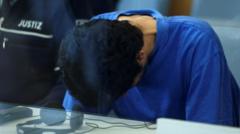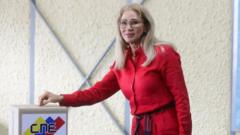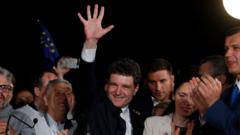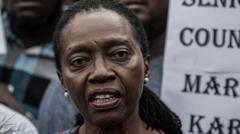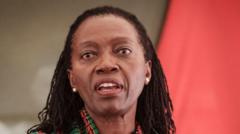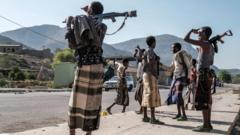This development adds to the already tense political climate in Bangladesh, with calls for elections intensifying as the interim government seeks more time to reform.
**Sheikh Hasina Faces Arrest Warrant Amid Protests Death Charges**

**Sheikh Hasina Faces Arrest Warrant Amid Protests Death Charges**
Bangladesh's former prime minister has been charged with inciting violence against protesters in a crackdown resulting in over a thousand deaths.
The turmoil in Bangladesh escalated on Sunday as a special court issued an arrest warrant for Sheikh Hasina, the former prime minister, following charges related to the deaths of more than a thousand protesters during her authoritarian regime. This unprecedented move marks a significant moment in the legal actions initiated by the International Crimes Tribunal, which Ms. Hasina herself established in 2010, targeting historical war crimes but now turning its scrutiny toward her own contentious rule.
Chief prosecutor Mohammad Tajul Islam highlighted that the charges against Sheikh Hasina include incitement, facilitation, and conspiracy regarding the violent crackdown that took place last July. It is alleged that she orchestrated systematic violence against peaceful demonstrators before she fled to India, where she currently resides.
The implications of these charges resonate deeply within Bangladesh's political landscape, which has been marred by allegations against the interim administration led by Muhammad Yunus, the 84-year-old Nobel Laureate. Opposition parties criticize the new government for delaying electoral processes, with calls for elections to be held by December. Yunus proposes extending this timeline, claiming additional months are necessary to enact reforms aimed at ensuring fair elections.
In a historical first, the tribunal’s proceedings were broadcasted live, highlighting the gravity of the situation. However, Sheikh Hasina and her co-defendants were notably absent from the courtroom, raising questions about their responses to these serious allegations as the country navigates a crucial political juncture.
Chief prosecutor Mohammad Tajul Islam highlighted that the charges against Sheikh Hasina include incitement, facilitation, and conspiracy regarding the violent crackdown that took place last July. It is alleged that she orchestrated systematic violence against peaceful demonstrators before she fled to India, where she currently resides.
The implications of these charges resonate deeply within Bangladesh's political landscape, which has been marred by allegations against the interim administration led by Muhammad Yunus, the 84-year-old Nobel Laureate. Opposition parties criticize the new government for delaying electoral processes, with calls for elections to be held by December. Yunus proposes extending this timeline, claiming additional months are necessary to enact reforms aimed at ensuring fair elections.
In a historical first, the tribunal’s proceedings were broadcasted live, highlighting the gravity of the situation. However, Sheikh Hasina and her co-defendants were notably absent from the courtroom, raising questions about their responses to these serious allegations as the country navigates a crucial political juncture.







